PreviewsIssue 85, Fall/Winter 2024-25
-

Juiceboxers
Benjamin Hertwig
Based on the author’s experiences as a soldier in Afghanistan, this novel explores questions of masculinity and militarism, friendship and loss, violence and trauma, and ideology and innocence, tracing teenager Plinko’s journey from basic military training in Saskatchewan, to high school and the reserves in Edmonton, and, after 9/11, to the battlefields of Kandahar, and then to the oil fields of Alberta.
-
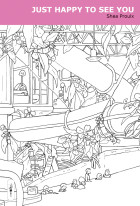
Just Happy to See You
Psychedelic visual narratives combine with hilarious punchlines to create bizarre and captivating sequential art, covering such items as pandemic cocktails, murderous clones, and singing flowers.
-

Kicking Out the Bucket List
Living Life with Intention and Passion
Glenda Mitchell
Using her own stories of adventure and rich experiences, this motivational coach encourages readers to live their lives to the fullest, starting now.
-

Les papillons du Québec
Simone Hébert Allard, Janet La France (Illustrator)
Agrémenté de photographies et d’illustrations humoristiques en pleine couleur, ce livre présente aux jeunes les principales espèces de papillons que l’on retrouve au Québec. Cette œuvre bien documentée décrit les faits biologiques, les modes de vie et les particularités les plus captivantes de chaque papillon, et témoigne d’une grande sensibilité envers la fagilité et l’importance de ces espèces régionales. Embellished with humorous photographs and illustrations in full colour, this book introduces young people to the main species of butterflies found in Quebec. This well-documented work describes the biological facts, lifestyles, and most captivating characteristics of each butterfly, and shows a great sensitivity to the fragility and importance of these regional species.
-

Les plaisirs malicieux
Marcien Ferland
Avec Les plaisirs malicieux, l’auteur emmène le lecteur dans les méandres de ce que la vie comporte de plus pur et de plus vicié. Avec un style concis, fluide, ponctué de perles langagières, ce recueil pique la curiosité et maintient l’intérêt malgré l’intensité de certains récits. With Les plaisirs malicieux, the author takes the reader on a meandering path through the purest and most flawed experiences that life has to offer. The concise, fluid style, punctuated by linguistic pearls of this collection piques the reader’s curiosity and maintains their interest despite the intensity of some of the stories.
-

Les Premières Nations, 2e édition
Robert Livesey, A.G. Smith (Illustrator), Marie-Hélène Duval (Translator)
Ce livre, de la riche et innovante collection À la découverte du Canada, révèle une ère précédant l’arrivée des colons européens dans le vaste territoire qui allait devenir le Canada, à une époque où les terres étaient habitées par les Autochtones à eux seuls. Les Premières Nations permet aux jeunes lecteurs de mieux comprendre – de façon interactive et amusante – l’histoire et la culture des Autochtones au Canada. This book, part of the rich and innovative Discovering Canada series, reveals an era before European settlers arrived in the vast territory that would become Cananda, a time when the land was inhabited by Indigenous Peoples alone. Les Premières Nations give young readers a better understanding – in an interactive and fun way – of the history and culture of Indigenous Peoples in Canada.
-
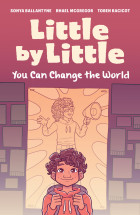
Little by Little
You Can Change the World
Sonya Ballantyne, Rhael McGregor (Illustrator)
This book tells the true story of Michael Redhead Champagne, an Indigenous activist, and how at a young age he found his voice at a youth conference and went on to use it to create change in his community.
-
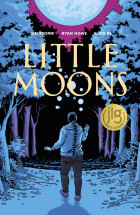
Little Moons
Jen Storm, Ryan Howe (Illustrator)
Thirteen-year-old Reanna and her family grieve the loss of her sister Chelsea, who went missing a year ago; Reanna’s mom moved to the city, and Reanna is left with her brother and father on the reserve. Can she let go of her anger and find comfort through tradition and the ever-present spirit of her sister?
-
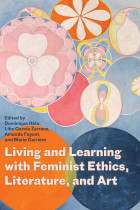
Living and Learning with Feminist Ethics, Literature, and Art
Dominique Hétu (Editor), Libe García Zarranz (Editor), Amanda Fayant (Editor), Marie Carrière (Editor)
This transdisciplinary collection investigates relations of “living and learning with,” seeing them as compelling forms of encounter, engagement, and care between self and other human, non-human, and more-than-human beings.
-
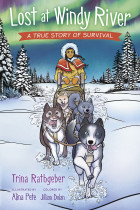
Lost at Windy River
A True Story of Survival
Trina Rathgeber, Alina Pete (Illustrator)
Written by the granddaughter of the main character, Ilse Schweder, this book tells the true story of how a young Indigenous girl survived nine days lost in a snowstorm in northern Canada in 1944, and of how as an older woman, she began telling her stories in schools, taking her story back from Farley Mowat, who wrote about it in People of the Deer.









